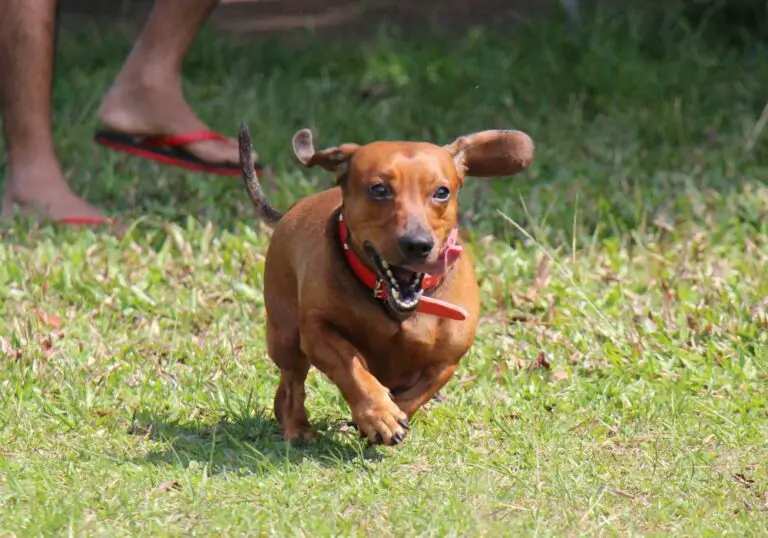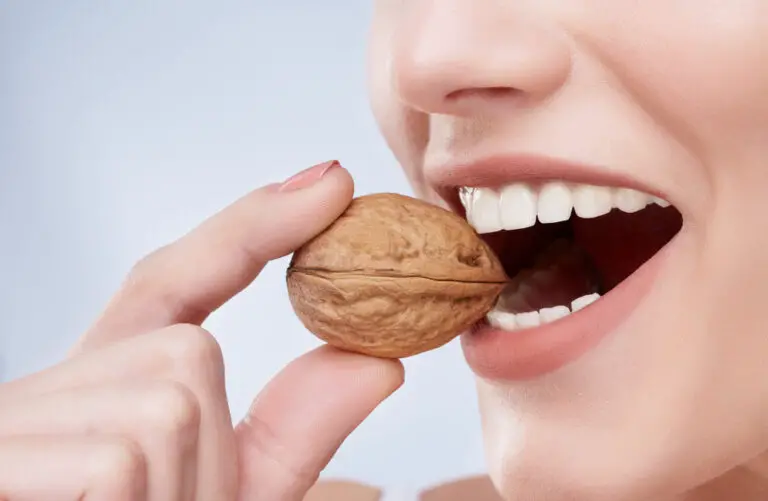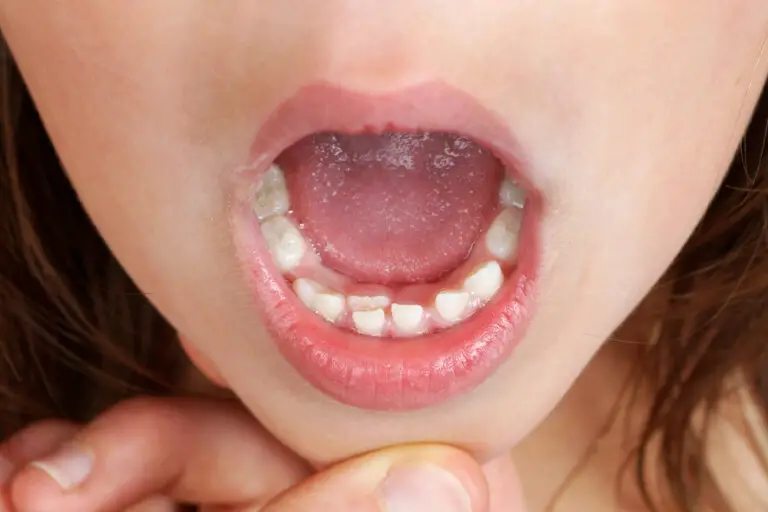It’s common for dog owners to notice their furry companions grinding their teeth. Also known as bruxism, teeth grinding in dogs can occur for a variety of concerning reasons. While occasional tooth grinding may be normal, especially as a puppy is teething, persistent and frequent bruxism in adult dogs often signals underlying pain or illness.
Determining why your dog is grinding its teeth is crucial so that the cause can be properly diagnosed and treated. Teeth grinding is often a symptom of a larger problem impacting your dog’s health and comfort. As a caring pet owner, it’s important to identify potential causes and work closely with your veterinarian to help your beloved dog feel better soon.
What Causes Teeth Grinding in Dogs?
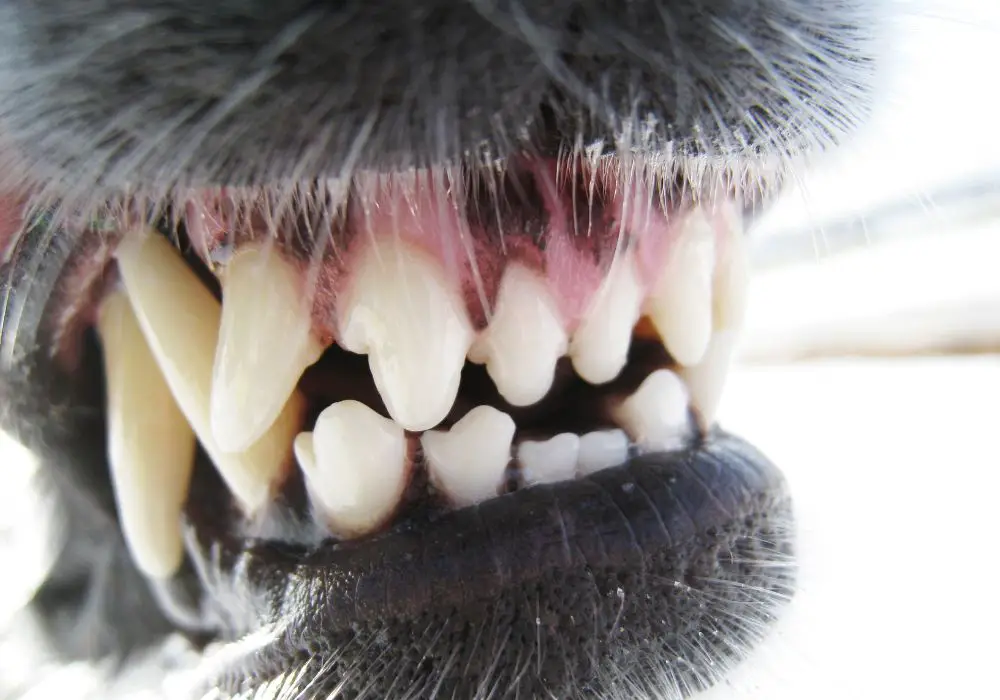
There are several possible explanations for why a dog grinds its teeth, which generally fit into two main categories:
1. Dental or Oral Pain
One of the most common causes of bruxism in dogs is direct dental pain. Possible dental problems that can lead to teeth grinding include:
- Tooth fractures– Cracks or breaks in the enamel or roots of teeth are very painful. Chewing and grinding may be an attempt to relieve pressure on damaged teeth.
- Dental decay– Accumulation of tartar and bacteria can destroy tooth structures and cause cavities or abscessed teeth. The infection causes significant pain.
- Gum disease– Gingivitis and periodontal disease cause gums to become inflamed and bleed. The inflammation puts pressure on teeth.
- Loss of teeth– Missing teeth can make chewing difficult and put more strain on remaining teeth.
- Oral injuries– Lacerations, puncture wounds or trauma to the mouth from falls or accidents involving sharp objects can all cause mouth pain that leads to bruxism.
- Oral tumors/growths– Both benign and malignant masses in the mouth area can cause discomfort and grinding.
- Recent dental procedures– Dogs may grind their teeth during recovery from professional cleanings, tooth extractions, or oral surgery due to post-procedure soreness and inflammation.
2. Other Health Issues Causing Discomfort
Dogs may also grind their teeth in response to pain or illness impacting other parts of the body, including:
- Arthritis– Inflammation and stiffness in the jaw joints or neck vertebrae makes chewing painful. The joints grind and pop instead of smoothly articulating.
- Gastrointestinal issues– Problems like food allergies, inflammatory bowel disease, gas, bloating, nausea and constipation cause abdominal discomfort that can lead to bruxism.
- Neurological disorders– Conditions like epilepsy, brain tumors and other diseases of the nervous system can cause involuntary tremors of the jaw muscles. Seizures may manifest as teeth grinding.
- Medication side effects– Drugs like phenobarbital and opioids are sometimes associated with bruxism as an adverse reaction. The grinding stems from drug-induced muscle and nerve issues.
- Infections– Systemic illnesses like kidney disease, cancer or endocarditis make dogs generally feel unwell. Fevers, pain and nausea from infections can cause teeth grinding.
- Stress/anxiety– New environments, loud noises, separation from owners, unfamiliar people or a change in routine can trigger stress in dogs. Teeth grinding provides an outlet for mental tension.
- Liver or kidney disease – If the kidneys or liver are not functioning properly due to disease or failure, it results in pets feeling unwell. Toxins and waste build up in the bloodstream which causes nausea.
- Endocrine issues – Disorders of the endocrine system like diabetes, hypothyroidism, and Cushing’s disease lead to fluctuations in hormones. The hormonal imbalances make dogs feel unwell.
- Cancer– Forms of cancer that cause pain such as bone cancer or tumors pressing on nerves or organs result in discomfort. The pain and nausea lead dogs to grind their teeth.
- Autoimmune disease– Disorder like Addison’s disease or lupus that affect the immune system cause generalized pain and malaise. Grinding teeth can provide temporary relief for dogs with autoimmune disorders.
Signs Your Dog May Be Grinding Its Teeth Because of Pain
Dog owners should watch for these signs that may indicate underlying pain or illness as the cause of bruxism:
- Grinding is frequent and occurs multiple times per day
- Grinding episodes last for extended periods of time
- Dog seems irritable or restless alongside grinding teeth
- Other new behaviors like decreased appetite, lethargy, or lameness accompany bruxism
- Grinding is rhythmic or patterned instead of random
- Noises from crunching/grinding teeth are loud and noticeable
- Grinding occurs when awake and not just during sleep
- Evidence of broken tooth fragments or trauma to the mouth
- Drooling, lip licking, or pawing at mouth after grinding episode
- Obvious dental issues like swollen gums, bad breath, or broken teeth
If any of these warning signs are present, schedule an appointment with your veterinarian for an exam. Leaving underlying illness untreated will allow your dog’s discomfort to persist and likely worsen over time. It’s important to identify the source of pain early on.
Diagnosing The Underlying Cause of Bruxism
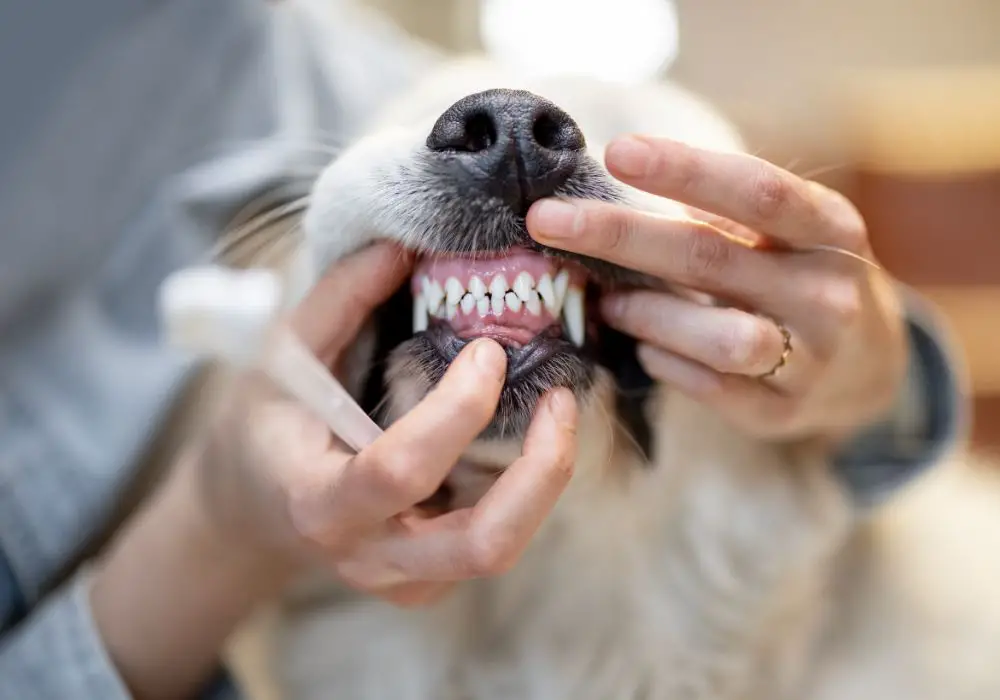
To determine what is causing your dog to grind its teeth, the veterinarian will begin with a full history and physical exam. Be prepared to explain when the bruxism started, what it looks and sounds like, and any other recent changes you’ve observed in your dog.
Your vet will likely recommend:
- Complete oral exam– Checking teeth, gums, tongue, cheeks and palate for signs of problems
- Dental x-rays– Images to visualize below the surface for decay, root issues, and abnormal growths
- Bloodwork– A complete blood count and biochemistry panel checks for infection, kidney issues, diabetes and other systemic illness
- Urinalysis– Evaluates kidney function and checks for hidden illnesses
- Fecal exam– Screens for intestinal parasites that could cause GI upset
- Neurologic evaluation– Assesses coordination, gait, reflexes, and muscle function
- Endocrine testing– Screens thyroid, adrenal, and sex hormone levels if hormone disorder is suspected
- Imaging– X-rays, MRI, or CT scans to assess joints, digestive organs, or the brain
Based on exam findings and test results, your vet can pinpoint issues like dental disease, arthritis, gastrointestinal problems, infections, or neurological conditions that are likely causing your dog’s discomfort and bruxism.
Treatment Options for Dogs Grinding Teeth
Once an underlying issue causing bruxism is identified, targeted treatment can provide relief and allow the teeth grinding to resolve. Common treatments may include:
Dental Problems
- Tooth extraction – Removing badly damaged or decayed teeth
- Dental radiographs – X-rays taken annually help identify problems below the gumline
- Professional dental cleanings – Tartar and bacteria removal above and below the gumline
- Antibiotics – Prescribed to treat dental infections and oral abscesses
- Pain medication – Eg carprofen or meloxicam; provides temporary relief from dental pain
- Special diets – Kibble or canned food designed to reduce tartar buildup
- Oral rinses – Antiseptic rinses like chlorhexidine help fight infection
- Crowns or braces – Repair fractured or misaligned teeth
- Basic extractions – Pulling retained baby teeth to prevent crowding and dental disease
- Complex extractions – Extracting impacted or complicated teeth under anesthesia
- Root canals – Removing inner pulp of badly infected teeth to preserve the tooth
Arthritis/Joint Issues
- Pain relievers – Eg carprofen, meloxicam, gabapentin
- Joint fluid modifiers – Eg pentosan, adequan
- Weight management – Maintaining ideal body weight reduces joint stress
- Physical therapy – Passive range of motion and exercise programs
- Massage – Increase blood flow and relax tight muscles around painful joints
- Acupuncture – Proven to reduce inflammation and arthritis pain
- Dietary supplements – Eg fish oil, turmeric, glucosamine
- Orthotics – Custom braces, prosthetics, shoe inserts to improve function
Gastrointestinal Upset
- Diet change – Novel or hydrolyzed protein diets, probiotics
- Anti-nausea medication – Eg maropitant (Cerenia), ondansetron
- Antacids – Reduce stomach acid and allow damaged areas to heal
- Anti-gas medication – Simethicone helps break up gas bubbles
- Probiotics – Restore balance of healthy bacteria in the gut
- Imaging – X-rays or ultrasound to evaluate stomach/intestines
- Endoscopy – Camera down the throat to inspect GI tract
- Bloodwork – Tests for pancreatitis, IBD, or vitamin deficiencies
- Parasite prevention – Dewormers kill intestinal worms and protozoa
Infections
- Antibiotics – Target underlying bacterial infections
- Antifungals – Treat systemic fungal infections or yeast overgrowth
- Antivirals – Control some viral infections
- Pain relievers – Improve comfort until infection clears
- IV fluids – Fluids and hospitalization for dehydration
- Immunosuppressants – Manage autoimmune disorders
- Chemotherapy – Kill cancer cells, shrink tumors
Neurologic Conditions
- Seizure medications – Phenobarbital, levetiracetam, zonisamide other anticonvulsants
- MRI – Diagnose tumors, inflammation, and structural issues
- Surgery – Tumor removal, treatment of hydrocephalus
- Physical therapy – Improve mobility and function
- Behavioral therapy – Teach adaptive behaviors
Anxiety Issues
- Pheromones – Plug-in diffusers release calming chemicals
- Prescription anxiety medication – Eg fluoxetine, clomipramine
- Supplements – Over the counter calming treats or chews
- Behavior modification training – Change reactions to stressors
- Exercise – Physical activity alleviates anxiety
- Massage – Releases relaxing endorphins
- Calming collar – Apply gentle pressure to relieve tension
- Lavender aromatherapy – Soothes the nervous system
Follow your veterinarian’s treatment recommendations closely to achieve long-term resolution of your dog’s teeth grinding. It make take some trial and error to find the right solutions. Be patient and keep communicating with your vet about how your dog responds.
Caring For a Dog with Bruxism at Home
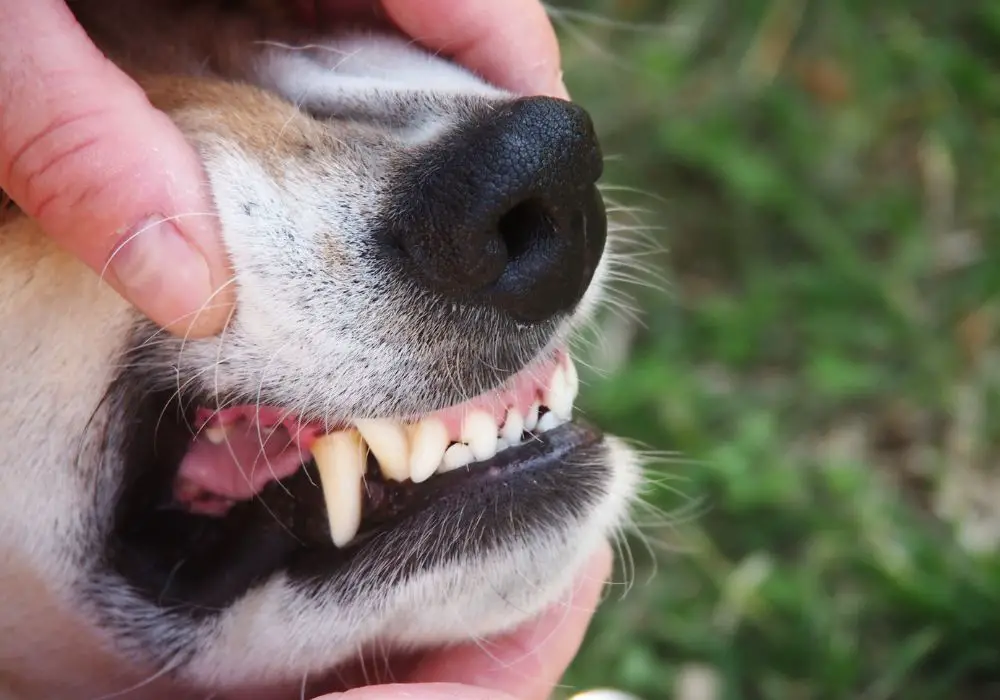
As you pursue long-term treatment for the cause of bruxism, there are interim steps you can take at home to relieve your dog’s discomfort:
- Gently massage jaw and facial muscles to help your dog relax and increase blood circulation
- Apply cold compresses to the jaw for anti-inflammatory effects
- Provide soft canned food or soaked kibble that’s easier to chew
- Give safe rubber chew toys to satisfy the urge to grind
- Try calming supplements or pheromone diffusers for anxious dogs
- Ensure your dog gets adequate pain medication on schedule
- Prevent stress by sticking to consistent daily routines when possible
- Monitor for worsening of grinding or new concerning symptoms
While home care provides relief in the short-term, veterinary treatment to resolve the underlying problem is still needed. Work closely with your vet for the best outcome.
When to Seek Emergency Care
Though not an emergency in most cases, some symptoms do warrant urgent veterinary attention:
- Sudden inability to open or close the mouth
- Jaws appear locked and unable to release
- Excessive drooling and pawing at the mouth or face
- Crying, whimpering or other signs the dog is in severe pain
- Bleeding from the mouth
- Loss of appetite or stopping eating for more than 24 hours
- Dizziness, trouble standing or walking
- Collapse or loss of consciousness
If any of these signs accompany teeth grinding, seek emergency care day or night. They likely indicate a significant problem like a fractured jaw, abscessed tooth, gastrointestinal obstruction, or other issue requiring immediate treatment.
Questions and Answers About Bruxism in Dogs
Why does my dog grind his teeth when sleeping?
Occasional gentle teeth grinding during sleep is normal, especially in puppies, as jaws relax and dreaming occurs. But loud, frequent grinding while asleep in adult dogs usually indicates pain or illness is disrupting normal rest. Be sure to observe daytime behavior changes too.
Is teeth grinding dangerous for dogs?
Over time, severe bruxism can lead to fractured teeth or excess tooth wear. It can worsen dental disease and damage tooth roots. Most importantly, it signals an underlying problem causing the dog discomfort and distress. Be sure to have your vet evaluate any persistent grinding.
When should I worry about puppy teeth grinding?
Some teeth grinding in puppies is expected as they teethe and break in new teeth. But excessive, forceful grinding at any age could indicate an issue. Contact your vet if puppy grinding seems abnormal or is paired with lethargy, reduced appetite, diarrhea or other concerning symptoms that point to an illness.
How can I stop my dog grinding his teeth at night?
Provide a chew toy at bedtime to give your dog an alternative to grinding his teeth. Calming treats, music, or pheromone plug-ins may help relax your dog at night if anxiety is the cause. Ensure any pain or illness is being properly managed during the daytime too.
Why does my dog chatter his teeth after licking?
“Chatter teeth” after eating or licking is generally harmless lip smacking behavior in dogs. Their lips and jaws are just moving involuntarily in response to the sensory stimulation. But chronic or very loud teeth chattering could indicate a problem. Observe if it seems associated with nausea or gastrointestinal upset.
Conclusion
If your canine companion has suddenly started grinding his teeth, it’s important to find out why. Frequent bruxism usually indicates your dog is experiencing discomfort or pain. Working with your veterinarian to diagnose the underlying cause is crucial. Treatment targeting the source of the problem, whether dental disease, joint issues, illness or anxiety, will provide true relief. With patience and ongoing care, your dog’s teeth grinding can resolve allowing him to feel his best again. Stay attentive to any worrying symptoms and keep up with follow-up veterinary care.

